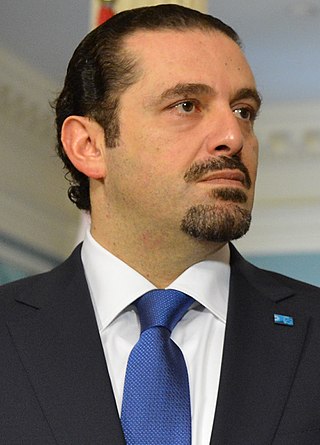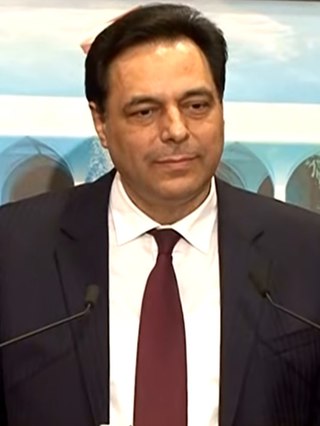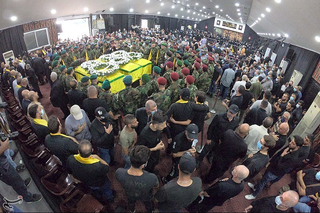Contents
| |||||
| Decades: | |||||
|---|---|---|---|---|---|
| See also: | |||||
Events in the year 2021 in Lebanon .
| |||||
| Decades: | |||||
|---|---|---|---|---|---|
| See also: | |||||
Events in the year 2021 in Lebanon .
Ongoing – COVID-19 pandemic in Lebanon


The history of Lebanon covers the history of the modern Republic of Lebanon and the earlier emergence of Greater Lebanon under the French Mandate for Syria and the Lebanon, as well as the previous history of the region, covered by the modern state.

Michel Naim Aoun is a Lebanese politician and former general who served as the 13th president of Lebanon from 31 October 2016 to 30 October 2022.

Saad El-Din Rafik Al-Hariri is a Lebanese businessman and politician who served as the prime minister of Lebanon from 2009 to 2011 and 2016 to 2020. The son of Rafic Hariri, he founded and has been leading the Future Movement party since 2007. He is seen as "the strongest figurehead" of the March 14 Alliance.
The Israeli–Lebanese conflict, or the South Lebanon conflict, is a long-running conflict involving Israel, Lebanon-based paramilitary groups, and sometimes Syria. The conflict peaked during the Lebanese Civil War. In response to Palestinian attacks from Lebanon, Israel invaded the country in 1978 and again in 1982. After this it occupied southern Lebanon until 2000, while fighting a guerrilla conflict against Shia paramilitaries. After Israel's withdrawal, Hezbollah attacks sparked the 2006 Lebanon War. A new period of conflict began in 2023, leading to the 2024 Israeli invasion of Lebanon.
Along with the Amal Movement, Hezbollah is one of the two main parties representing the Shia community, Lebanon's largest religious bloc. Amal has made a commitment to carrying out its activities through political means, but remains a partial fighting force aiding Hezbollah when the need arises.

The 2006–2008 Lebanese protests were a series of political protests and sit-ins in Lebanon that began on 1 December 2006, led by groups that opposed the US and Saudi-backed government of Prime Minister Fouad Siniora and ended on 21 May 2008 with the signing of the Doha Agreement. The opposition was made up of Hezbollah, Amal, and the Free Patriotic Movement (FPM); a number of smaller parties were also involved, including the Marada party, the Lebanese Communist Party and the Syrian Social Nationalist Party. A majority of the members of the government were part of the anti-Syrian March 14 Alliance, a coalition of political parties and independents in Lebanon. The two groups were also divided along religious lines, with most Sunnis and Druze supporting the government, and most Shi'a supporting the opposition. The Christian community was split between the two factions, with Michel Aoun, the leader of the FPM, claiming to have more than 70% support among the Christians, based on the results of the 2005 parliamentary election.

On 9 November 2009, after five months of negotiations following the 2009 parliamentary elections, Lebanese prime minister Saad Hariri formed a national unity government.

The 2011 Lebanese protests, also known as the Intifada of Dignity or Uprising of Dignity were seen as influenced by the Arab Spring. The main protests focused on calls for political reform especially against confessionalism in Lebanon. The protests initiated in early 2011, and dimmed by the end of the year. In another aspect of the Arab Spring, Lebanese pro and anti-Assad factions descended into sectarian violence, which culminated in May–June 2012.

The formation of a new government led by Najib Mikati follows five months of negotiations after the fall of the Saad Hariri government. Mikati formed a controversial 30-minister cabinet. Following ruptures and tensions and two previous threats to resign, Mikati finally resigned on 23 March 2013. Tammam Salam was tasked to form a new government on 6 April 2013.

Hassan Diab is a Lebanese academic, engineer and politician who served as the prime minister of Lebanon from 21 January 2020 to 10 September 2021. He was appointed by President Michel Aoun in 2019 to succeed Saad Hariri as prime minister. He submitted his resignation on 10 August 2020 in wake of the 2020 Beirut explosion and served as caretaker prime minister until Najib Mikati formed a new government on 10 September 2021. Prior to his premiership, he served as the minister of education from June 2011 to February 2014 under President Michel Suleiman.
From its inception, the Syrian Civil War has produced and inspired a great deal of strife and unrest in the nation of Lebanon. Prior to the Battle of Arsal in August 2014, the Lebanese Army has tried to keep out of it and the violence has been mostly between various factions within the country and overt Syrian involvement has been limited to airstrikes and occasional accidental incursions.
The following lists some remarkable events that happened in 2014 in Lebanon on a monthly basis.

The 17 October Protests, commonly referred to as the 17 October Revolution or Hirak or Thawrah, were a series of civil protests in Lebanon that began after the Lebanese cabinet announced financial measures on 17 October 2019. These national protests were triggered by planned taxes on gasoline, tobacco, and VoIP calls on applications such as WhatsApp, but quickly expanding into a country-wide condemnation of sectarian rule, the stagnation of the economy, unemployment, endemic corruption in the public sector, legislation that was perceived to shield the ruling class from accountability and failures of the government to provide basic services such as electricity, water, and sanitation.
Events in the year 2020 in Lebanon.

A new Lebanese cabinet led by Prime Minister Hassan Diab was formed in Lebanon on 21 January 2020, after agreement was reached by the heads of the involved political parties after nearly three months. Diab was appointed prime minister by President Michel Aoun following the resignation of Saad Hariri following the 2019–20 Lebanese protests, that started in October 2019.

The diplomatic relations between Lebanon and Saudi Arabia are the relationship between two Arab nations in the Middle East. Lebanon has an embassy in Riyadh and Saudi Arabia has one in Beirut.

The 2021 Beirut clashes, also known as the 2021 Beirut massacre, Tayouneh Incident or Mini May 7, occurred in the Tayouneh neighborhood of the Lebanese capital of Beirut on 14 October 2021 between Hezbollah and the Amal Movement, and unidentified gunmen allegedly associated with the Lebanese Forces, and the Lebanese Armed Forces, resulting in the death of seven people and injury of 32 others, and the arrest of nine by the Lebanese Armed Forces. The violence erupted during a protest organized by Hezbollah and its allies against Tarek Bitar, the lead judge probing the 2020 explosion in the city's port, as they accuse him of being partisan. The clashes took place at the Justice Palace, located in Eastern Beirut along the former civil war front line between the Christian and Muslim Shiite areas. The clashes were the worst in the country since the 2008 Lebanon conflict.
Events in the year 2022 in Lebanon.
Events in the year 2023 in Lebanon.
Events in the year 2024 in Lebanon.